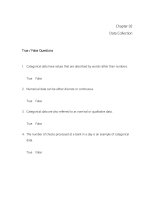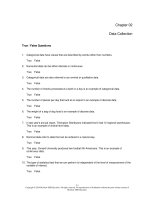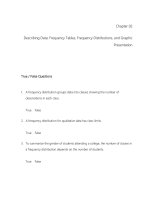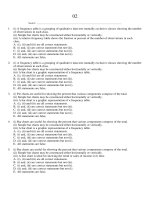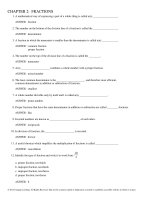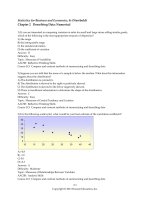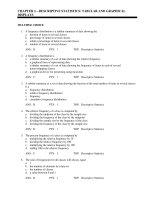Test bank for statistics for business and economics 7th edition
Bạn đang xem bản rút gọn của tài liệu. Xem và tải ngay bản đầy đủ của tài liệu tại đây (113.72 KB, 20 trang )
Test Bank for Statistics for Business and Economics 7th
Edition
Which of the following variables is an example of a categorical
variable?
•
A) The amount of money you spend on eating out each month.
•
B) The time it takes you to write a test.
•
C) The geographic region of the country in which you live.
•
D) The weight of a cereal box.
* Which of the following is an example of a discrete random
variable?
•
A) The monthly electric bill for a local business.
•
B) The number of people eating at a local café between noon and
2:00 p.m.
•
C) The amount of time it takes for a worker to complete a complex
task.
•
D) The percentage of people living below the poverty level in a
Boston.
* What is the correct ranking of data from weakest or lowest type to
strongest or highest type?
•
A) Nominal, ordinal, interval and ratio
•
B) Ordinal, nominal, interval and ratio
•
C) Interval, nominal, ratio and ordinal
•
D) Nominal, interval, ordinal, and ratio
* Professor Matherly graduated from the University of Tennessee
with a code value = 1 while Professor Hansen graduated from the
University of Wisconsin with a code value = 2. The scale of
measurement likely represented by this information is:
•
A) nominal
•
B) ordinal
•
C) interval
•
D) ratio
* A measurement scale that rates product quality as either 1 = poor,
2 = average and 3 = good is known as
•
A) nominal
•
B) ordinal
•
C) interval
•
D) ratio
* Which of the following statements involve descriptive statistics as
opposed to inferential statistics?
•
A) The Alcohol, Tobacco and Firearms Department reported that
Houston had 1,791 registered gun dealers in 1997.
•
B) Based on a survey of 400 magazine readers, the magazine
reports that 45% of its readers prefer double column articles.
•
C) The FAA samples 500 traffic controllers in order to estimate the
percent retiring due to job stress related illness.
•
D) Based on a sample of 300 professional tennis players, a tennis
magazine reported that 25% of the parents of all professional tennis
players did not play tennis.
* The width of each bar in a histogram corresponds to the
•
A) midpoint of the class
•
B) number of observations in the class
•
C) boundaries of the class
•
D) percentage of observations in the class
* Which of the following is not a goal of descriptive statistics?
•
A) Summarizing data
•
B) Displaying aspects of the collected data
•
C) Reporting numerical findings
•
D) Estimating characteristics of the population
* Which of the following statements is incorrect?
•
A) Ordinal data may be described as qualitative.
•
B) Nominal data may be described as quantitative.
•
C) A categorical variable may produce ordinal data.
•
D) A discrete numerical variable may produce ratio scale data.
* Which of the following are not typical uses of inferential statistics?
•
A) Develop forecasts
•
B) Summarize data
•
C) Provide estimates
•
D) Make predictions
* When grouping data into classes it is recommended that to have:
•
A) exactly 5 classes
•
B) between 5 and 20 classes
•
C) at least 5 classes
•
D) at most 10 classes
* A researcher used a procedure to select a sample of n objects from
a population in such a way that each member of the population is
chosen strictly by chance, is equally likely to be chosen, and every
possible sample of size n has the same chance of selection. The
procedure used by the researcher is known as:
•
A) descriptive statistics
•
B) inferential statistics
•
C) simple random sampling
•
D) None of the above
* Consider the terms: information, data, and knowledge. From a
statistical standpoint, list these terms in order of increasing
usefulness in making decisions.
•
A) Information, data, and knowledge
•
B) Data, information, and knowledge
•
C) Knowledge, information, and data
•
D) Knowledge, data, and information
* Inferential statistics is a process that involves all of the following
except:
•
A) estimating a sample statistic
•
B) estimating a population parameter
•
C) testing a hypothesis
•
D) Both A and B
* Suppose a survey is taken of 300 high school seniors. This group is
probably a
•
A) sample
•
B) population
•
C) system
•
D) process
* When data are collected in a statistical study for only a portion or
subset of all elements of interest the researcher is using a:
•
A) sample
•
B) parameter
•
C) statistic
•
D) population
* Which of the following is a quantitative variable?
•
A) The make of a washing machine
•
B) A person`s gender
•
C) Price of a car in thousands of dollars
•
D) Whether a person is a college graduate or not
* A line graph that connects points that represent the cumulative
percentage of observations below the upper limit of each class
interval in a cumulative frequency distribution is known as a(n):
•
A) ogive
•
B) frequency histogram
•
C) frequency polygon
•
D) scatter plot
* Pareto’s principle is applied to a wide variety of behavior over
many systems. It is sometimes referred to as the:
•
A) “20-80” Rule
•
B) “80-20” Rule
•
C) “10-90” Rule
•
D) “90-10” Rule
* Which of the following is most likely a continuous numerical
variable?
•
A) The number of gallons of paint purchased
•
B) The number of reams of paper ordered
•
C) The population of Egypt in 2005
•
D) The number of miles of interstate highways
* The length of time it takes to assemble a particular electronic
component varies from one employee to another. Management has
collected the time (in minutes) it took 20 different employees to
assemble the component. The information is summarized in the
following frequency distribution generated by Excel.
•
A) 50% of all the workers took exactly 15 minutes to assemble the
component.
•
B) 100% of all the workers took longer than 25 minutes to
assemble the component.
•
C) Eleven workers assembled the component in 20 minutes or less.
•
D) Seven workers took 25 minutes or longer to assemble the
component.
* Consider the following frequency distributions generated by Excel.
What is the missing cumulative % value identified by asterisk?
•
A) 60.00%
•
B) 5.00%
•
C) 100%
•
D) 90%
* Consider the following frequency distribution generated by Excel.
What is the missing frequency value identified by asterisk?
•
A) 3
•
B) 15
•
C) 16
•
D) 25
* Data on the monthly expenses (in $) submitted by 15 people on a
firm’s sales staff are summarized in the following stem-and-leaf
display.
•
A) The leaf 7 represents $70.
•
B) The number 5 in the left-hand column tells us that five people
had expenses between $400 and $499.
•
C) The parentheses around the number 7 in the left-hand column
tell us that most of the employees had expenses between $300 and
$399.
•
D) There was one employee who spent at least $510.
* A sample of 30 professional men was asked to estimate their
yearly expenditures on clothes for work. The data are summarized
in the following stem-and-leaf display.
•
A) 87.7%
•
B) 13.3%
•
C) 16.7%
•
D) 83.3%
* Consider the following frequency distribution generated by Excel.
What proportion of these values are less than 63?
•
A) 25%
•
B) 60%
•
C) 65%
•
D) 35%
* Companies are often interested in knowing how customers learned
about their products. They often solicit this information on mail-in
warranty cards. The customers’ responses for a particular product
were gathered and the data are presented in the pie chart below.
•
A) 12%
•
B) 39%
•
C) 51%
•
D) 100%
* In this restaurant services study, the process of using sample information
for predictions, forecasts, and estimates is called:
•
A) inferential statistics
•
B) descriptive statistics
•
C) statistical survey
•
D) process
* In this restaurant services study, the process of using this information to
predict future needs of customers in the restaurant is called:
•
A) statistical survey
•
B) inferential statistics
•
C) descriptive statistics
•
D) forecasting
* In this restaurant services study, a listing of all customers in this
restaurant over a particular week would constitute a:
•
A) sample
•
B) population
•
C) numerical variable
•
D) process
* You asked ten of your classmates about their weight. On the basis
of this information, you stated that the average weight of all
students in your university or college is 142.6 pounds. This is an
example of:
•
A) descriptive statistics
•
B) inferential statistics
•
C) parameter
•
D) population
* In rating the service provided by a restaurant server, the following
responses are possible: excellent, above average, average, below
average, and poor. The responses are coded from 1 to 5 with 5 being
excellent. The scale of measurement these represent is:
•
A) nominal
•
B) ordinal
•
C) interval
•
D) ratio
* Which of the following is a categorical variable?
•
A) Tire pressure
•
B) Bank account balance
•
C) Daily sales in a store
•
D) Eye color
* An automobile insurance agent believes that company A is more
reliable than company B. Which scale of measurement does this
information represent?
•
A) Nominal
•
B) Ordinal
•
C) Interval
•
D) Ratio
* Which of the following statements involve inferential statistics as
opposed to descriptive statistics?
•
A) The FAA reported there were 200 near misses among airplanes
last year.
•
B) A class of fifty statistics students earned an average grade of
75.5.
•
C) The city business office reported 40 building permits for new
single-family housing units.
•
D) Based on a sample of 500 subscribers, a local cable system
estimates that forty percent of its subscribers watch a premium
channel at least once per day.
* Which of the following best describes the data: zip codes for
students attending Utah Valley University?
•
A) Qualitative
•
B) Numerical
•
C) Quantitative
•
D) Time-series
* Which of the following best describes the data: grade point
averages for athletes? A) Categorical A#B) Quantitative C)
Qualitative D) Relative frequency
* A company has developed a new battery, but the average lifetime
is unknown. In order to estimate this average, a sample of 100
batteries is tested and the average lifetime of this sample is found
to be 250 hours. The 250 hours is the value of a: A) parameter A#B)
statistic C) sampling frame D) population
* Consider the following data: like, no preference, or dislike. Which
of the following best describes these data? A#A) Qualitative B)
Numerical C) Quantitative D) Attitude
* A summary measure that is computed from a population is known
as a(n)
•
A) parameter
•
B) statistic
•
C) sample
•
D) inferential statistics
* At a large company, the majority of the employees earn from
$20,000 to $30,000 per year. Middle management employees earn
between $30,000 and $50,000 per year while top management earn
between $50,000 and $100,000 per year. A histogram of all salaries
would have which of the following shapes?
•
A) Symmetrical
•
B) Uniform
•
C) Skewed to right
•
D) Skewed to left
* Which of the following is the graphical analog of a frequency
table?
•
A) Histogram
•
B) Scatter plot
•
C) Time series plot
•
D) Contingency table
* Which of the following statements is false?
•
A) Relative frequencies are often useful in a presentation because
nearly everybody understands fractional parts when expressed as
percents.
•
B) Relative frequencies are particularly useful when comparing the
frequency distributions of two different size sets of data.
•
C) The histogram of a normal sample should have a distribution
shape that is skewed.
•
D) A stem-and-leaf display contains all the information needed to
create a histogram.
* Numerical variables can be subdivided into two types. What are
these?
•
A) Diverse and categorical
•
B) Discrete and continuous
•
C) Nominal and progressive
•
D) Cross-sectional and discrete
* A summary measure that is computed from a sample to describe a
characteristic of the population is known as a(n):
•
A) parameter
•
B) statistic
•
C) population
•
D) inferential statistics
* Gender and state of birth are examples of which type of data?
•
A) Discrete
•
B) Continuous
•
C) Categorical
•
D) Ordinal
* Which of the following statements is false?
•
A) A Pareto diagram is a bar graph with the bars arranged from the
most numerous categories to the least numerous categories.
•
B) A Pareto diagram includes a line graph displaying the
cumulative percentages and counts for the bars.
•
C) A Pareto diagram of types of defects will show the ones that
have the greatest effect on the defective rate in order of effect. It is
then easy to see which defects should be targeted in order to most
effectively lower the defective rate.
•
D) None of the above.
* A variable is classified as ordinal if:
•
A) There is a natural ordering of categories
•
B) There is no natural ordering of categories
•
C) The data arise from continuous measurements
•
D) The variable is tracked over a period of time
* A time series plot is essentially a:
•
A) histogram
•
B) scatter plot
•
C) Pareto diagram
•
D) pie chart


